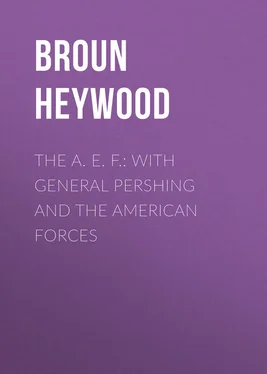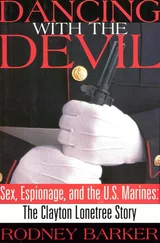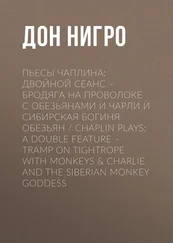Heywood Broun - The A. E. F. - With General Pershing and the American Forces
Здесь есть возможность читать онлайн «Heywood Broun - The A. E. F. - With General Pershing and the American Forces» — ознакомительный отрывок электронной книги совершенно бесплатно, а после прочтения отрывка купить полную версию. В некоторых случаях можно слушать аудио, скачать через торрент в формате fb2 и присутствует краткое содержание. ISBN: , Жанр: foreign_antique, foreign_prose, foreign_language, на английском языке. Описание произведения, (предисловие) а так же отзывы посетителей доступны на портале библиотеки ЛибКат.
- Название:The A. E. F.: With General Pershing and the American Forces
- Автор:
- Жанр:
- Год:неизвестен
- ISBN:http://www.gutenberg.org/ebooks/39072
- Рейтинг книги:4 / 5. Голосов: 1
-
Избранное:Добавить в избранное
- Отзывы:
-
Ваша оценка:
- 80
- 1
- 2
- 3
- 4
- 5
The A. E. F.: With General Pershing and the American Forces: краткое содержание, описание и аннотация
Предлагаем к чтению аннотацию, описание, краткое содержание или предисловие (зависит от того, что написал сам автор книги «The A. E. F.: With General Pershing and the American Forces»). Если вы не нашли необходимую информацию о книге — напишите в комментариях, мы постараемся отыскать её.
The A. E. F.: With General Pershing and the American Forces — читать онлайн ознакомительный отрывок
Ниже представлен текст книги, разбитый по страницам. Система сохранения места последней прочитанной страницы, позволяет с удобством читать онлайн бесплатно книгу «The A. E. F.: With General Pershing and the American Forces», без необходимости каждый раз заново искать на чём Вы остановились. Поставьте закладку, и сможете в любой момент перейти на страницу, на которой закончили чтение.
Интервал:
Закладка:
He let the smoke roll lazily out of his mouth and shook his head. "I wish I was back in El Paso," he said.
I found another soldier who was longing for Terre Haute. Him I came upon in the lounging room of a music hall called the Olympia. Two palpably pink ladies sat at the bar drinking cognac. From his table a few feet away the American soldier looked at them with high disfavor. Surprise, horror and indignation swept across his face in three waves as the one called Julie began to puff a cigarette after giving a light to Margot. He looked away at last when he could stand no more, and recognizing me as a fellow countryman, he began his protest.
"I don't like this Paris," he said. "I'm in the medical corps," he continued. "My home's in Terre Haute. In Indiana, you know. I worked in a drug store there before I joined the army. I had charge of the biggest soda fountain in town. We used to have as many as three men working there in summer sometimes. Right at a good business corner, you know. I suppose we had almost as many men customers as ladies."
"Why don't you like Paris?" I interrupted.
"Well, it's like this," he answered. "Nobody can say I'm narrow. I believe in people having a good time, but – " and he leaned nearer confidentially, "I don't like this Bohemia. I'd heard about it, of course, but I didn't know it was so bad. You see that girl there, the one in the blue dress smoking a cigarette, sitting right up to the bar. Well, you may believe it or not, but when I first sat down she came right over here and said, 'Hello, American. You nice boy. I nice girl. You buy me a drink.' I never saw her before in my life, you understand, and I didn't even look at her till she spoke to me. I told her to go away or I'd call a policeman and have her arrested. I've been in Paris a week now, but I don't think I'll ever get used to this Bohemia business. It's too effusive, that's what I call it. I'd just like to see them try to get away with some of that business in Terre Haute."
Some of the visiting soldiers took more kindly to Paris as witness the plaint of a middle-aged Franco-American in the employ of the Y. M. C. A.:
"I'm a guide for the Young Men's Christian Association here in Paris," he said, "but I'm a little bit afraid I'm going to lose my job. They make up parties of soldiers at the Y. M. C. A. headquarters every day and turn them over to me to show around the city. Well, Monday I started out with twelve and came back with five and today I finished up with three out of eight. I can't help it. I've got no authority over them, and if they want to leave the party, what can I do? But it makes trouble for me at headquarters. Now, today, for instance, I took them first of all to the Place Vendome. There were seven infantrymen and an artilleryman. They seemed to be interested in the column when I told them that it was made out of cannon captured by Napoleon. They wanted to know how many cannon it took and what caliber they were and all that. Everything went all right until we started for the Madeleine. We passed a café on the way and one of the soldiers asked: 'What's this "vin" I see around on shops?' I told him that it was the French word for wine and that it was pronounced almost like our word 'van' only a little bit more nasal. They all looked at the sign then, and another soldier said: 'I suppose that "bières" there is "beers," isn't it?'
"I told him that it was and another guessed that 'brune ou blonde' must mean 'dark or light.' When I said that it did, he wanted to know if he couldn't stop and have one. I told him that I couldn't wait for him, as the whole trip was on a schedule and we had to be at the Madeleine at three o'clock. 'Well,' he said, 'I guess it'll be there tomorrow,' and he went into the café. Another soldier said: 'Save a "blonde" for me,' and followed him, and that was two gone.
"After I had showed the rest the Madeleine I told them that I was going to take them to St. Augustin. The artilleryman wanted to know if that was another church. I said it was and he said he guessed he'd had enough for a day. I tried to interest him in the paintings in the chapel by Bouguereau and Brisset, but he said he wasn't used to walking so much anyway. He was no doughboy, he said, and he left us. We lost another fellow at Maxim's and the fifth one disappeared in broad daylight on the Boulevard Malesherbes. He can count up to twenty in French and he knows how to say: 'Oú est l'hotel St. Anne?' which is army headquarters, so I guess he's all right, but I haven't an idea in the world what became of him."
The high tide in the American conquest of Paris came one afternoon in July. I got out of a taxicab in front of the American headquarters in the Rue Constantine and found that a big crowd had gathered in the Esplanade des Invalides. Now and again the crowd would give ground to make room for an American soldier running at top speed. One of them stood almost at the entrance of the courtyard of "Invalides." His back was turned toward the tomb of Napoleon and he was knocking out flies in the direction of the Seine. Unfortunately it was a bit far to the river and no baseball has yet been knocked into that stream. It was a new experience for Napoleon though. He has heard rifles and machine guns and other loud reports in the streets of Paris, but for the first time there came to his ears the loud sharp crack of a bat swung against a baseball. Since he could not see from out the tomb the noise may have worried the emperor. Perhaps he thought it was the British winning new battles on other cricket fields. But again he might not worry about that now. He might hop up on one toe as a French caricaturist pictured him and cry: "Vive l'Angleterre."
One of the men in the crowd which watched the batting practice was a French soldier headed back for the front. At any rate he had his steel helmet on and his equipment was on his back. His stripes showed that he had been in the war three years and he had the croix de guerre with two palms and the medaille militaire. His interest in the game grew so high at last that he put down his pack and his helmet and joined the outfielders. The second or third ball hit came in his direction. He ran about in a short circle under the descending ball and at the last moment he thrust both hands in front of his face. The ball came between them and hit him in the nose, knocking him down.
His nose was a little bloody, but he was up in an instant grinning. He left the field to pick up his trench hat and his equipment. The Americans shouted to him to come back. He understood the drift of their invitation, but he shook his head. "C'est dangéreux," he said, and started for the station to catch his train for the front.
CHAPTER V
WITHIN SOUND OF THE GUNS
THE men had traveled to Paris in passenger coaches, but when it came time to move the first division to its training area in the Vosges our soldiers rode like all the other allied armies in the famous cars upon which are painted "Hommes 36; chevaux en long, 8." And, of course, anybody who knows French understands the caption to mean that the horses must be put in lengthwise and not folded. No restrictions are mentioned as to the method of packing the "hommes."
The journey lay through gorgeous rolling country which was all a sparkle at this season of the year. Presently the vineyards were left behind and the hills became higher. Now and again there were fringes of pine trees. At one point it was possible to see a French captive balloon floating just beyond the hilltops, but we could not hear the guns yet. French soldiers in troop trains and camps near the track cheered the Americans and even a few of the Germans inside a big stockade waved at the men who were moving forward to study war. The trains stopped at a little town which lay at the foot of a hill. It was a mean little town, but on the hill was the fine old tower of a castle which had once dominated the surrounding country.
Читать дальшеИнтервал:
Закладка:
Похожие книги на «The A. E. F.: With General Pershing and the American Forces»
Представляем Вашему вниманию похожие книги на «The A. E. F.: With General Pershing and the American Forces» списком для выбора. Мы отобрали схожую по названию и смыслу литературу в надежде предоставить читателям больше вариантов отыскать новые, интересные, ещё непрочитанные произведения.
Обсуждение, отзывы о книге «The A. E. F.: With General Pershing and the American Forces» и просто собственные мнения читателей. Оставьте ваши комментарии, напишите, что Вы думаете о произведении, его смысле или главных героях. Укажите что конкретно понравилось, а что нет, и почему Вы так считаете.












